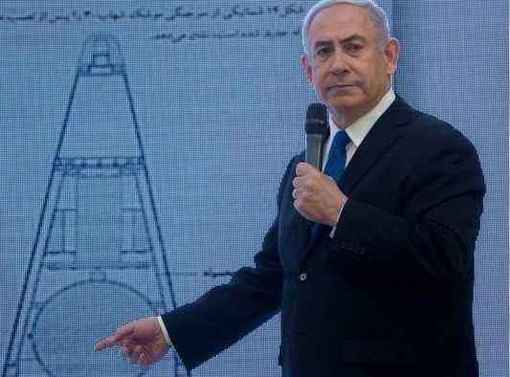
The trove of Iranian documents about its nuclear programme presented by Israeli Prime Minister Benjamin Netanyahu as proof of Tehran’s duplicity contain nothing of substance that was not known before.
Though the disclosure was made in order to justify President Donald Trump torpedoing the Iran nuclear deal on 12 May, Mr Netanyahu was unable to find any evidence that Iran has breached the agreement signed in 2015.
The vast cache of files presented by Mr Trump are largely historical and relate to the period before 2003. Mr Netanyahu’s purpose was to pillory Iran for lying about a nuclear weapons programme 15 years ago and before.
The White House has had some difficulty in adjusting its rhetoric to the historical nature of the disclosures, saying at first that they were proof that “Iran has a robust, clandestine nuclear weapons program”, but later changing “has” to “had”.
At issue is not the information in the archive, in which items introduced by Mr Netanyahu as revelatory turn out to have been published by the International Atomic Energy Agency (IAEA) in a report in 2011.
More important is the political effect of their publication. Mr Netanyahu’s performance appears geared to provide justification for Mr Trump bringing an end to the Joint Comprehensive Plan of Action (JCPOA), which is the lumbering official title of the Iran nuclear agreement.
By highlighting Iran’s past ambitions to construct a nuclear device. Mr Netanyahu unintentionally demonstrated – as several architects of the 2015 deal have commented – the need for the JCPOA, which made it impossible for Iran to build a nuclear weapon.
All the signatories of the agreement – US, UK, France, Germany, Russia and China – agree that it is working well.
What remains unclear is what the US and Israel will do after 12 May. The reimposition of US sanctions on Iran will be damaging to its economy, but they are not going to lead to regime change in Tehran.
It is unlikely that Iranian leaders would agree to a new JCPOA which would be tilted further against them than the present deal. A successful counter-offensive against Iranian influence in the northern tier of the Middle East – Iran, Iraq, Syria and Lebanon – is unlikely simply because of the strength of Iran’s position there.
The policy objectives of the Trump administration towards Iran could only be achieved by a prolonged war, but the administration may not realise this.
The new Secretary of State, Mike Pompeo, and the National Security Adviser, John Bolton, appear to take the advice of Iranian exile groups seriously, seeing the Iranian regime as more fragile than it is.
What makes the US withdrawal from the JCPOA so dangerous is that it is accompanied by an escalating military confrontation between Israel and Iran in Syria.
This is likely to get more serious, provoking Iran and Russia to retaliate against Israel. In fact, Mr Trump is stepping into the Syrian swamp in exactly the same way as previous US administrations have done in Iraq and Afghanistan.












 Posted in
Posted in 











